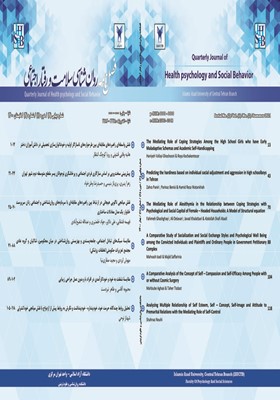Analyzing Multiple Relationships of Self-esteem, Self-Concept-Self-Image, and Attitude to Premarital Relations With the mediating role of Self-Control
Subject Areas : Psychology
1 - Assistant Professor, Department of Psychology, Shahroud Branch, Islamic Azad University, Shahroud, Iran.
Keywords: self-esteem, Self-Control, Self-Concept-Self-Image, Attitude to premarital relationships,
Abstract :
Objective: The purpose of this study was to analyze the multiple relationships of self-esteem, Self-Concept-Self-Image, and attitude to premarital relations with the mediating role of self-control in Shahroud.Method: Due to its nature, this research is a descriptive-correlation (structural equation). Statistical population includes all students of Islamic Azad University of Shahroud in the academic year of 1398-99. To determine sample size, Cochran's sample size estimation formula was used, which is 200 people. The sampling method is available. To collect data from the questionnaires of Attitude to Marital Correlation Questionnaire (2010), Self-Esteem Self-Esteem Scale (2006), Cooper Smith Self-esteem (1967) and Tanji, Pommister & Poon Self-Control (2004) used. Amos version 21 software and Pearson correlation method and path analysis were used for data analysis.Results: The results showed a significant relationship between self-control, self-esteem, Self-Concept-Self-Image, and attitude toward premarital relationships (P <0.05). There was also a significant relationship between self-esteem and self-concept and attitude toward premarital relationships (P <0.05). There was also a significant relationship between self-concept and self-concept with attitude toward premarital relationship (P <0.05).Conclusion: Therefore, it seems that families can increase their self-esteem and self-esteem in their children, resulting in a higher self-control in their children and, consequently, their children a healthy attitude toward marriage in the future. To find.
_||_

